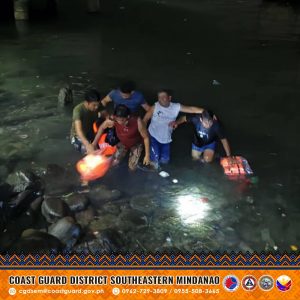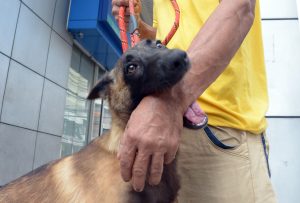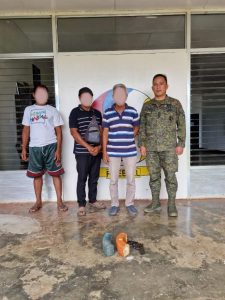 DAVAO CITY (MindaNews) — National Task Force (NTF) Covid-19 chief implementer Carlito Galvez on Wednesday ruled out placing Davao City under Enhanced Community Quarantine (ECQ) or Modified ECQ despite the “very alarming situation” brought about by the surge in COVID-19 cases.
DAVAO CITY (MindaNews) — National Task Force (NTF) Covid-19 chief implementer Carlito Galvez on Wednesday ruled out placing Davao City under Enhanced Community Quarantine (ECQ) or Modified ECQ despite the “very alarming situation” brought about by the surge in COVID-19 cases.
Galvez instead recommended a reversion to General Community Quarantine (GCQ) in the city from the present MGCQ, and granular lockdowns for barangays with a high number of COVID-19 cases which could include localized ECQ. “Doon tayo mag ECQ sa mga barangays” (We can have ECQs in these barangays), he said.
At the meeting of the Coordinated Operations to Defeat Epidemic (CODE) Team held at the Camp Quintin Merecido of the Police Regional Office (PRO) 11 on Wednesday afternoon, Galvez acknowledged that the situation in the city requires a stricter quarantine classification to stem the spread of the infection.
“I will recommend that Davao City should at least go to GCQ,” he said.
Galvez said the local government units, including cities of Davao and Cebu, which are struggling in managing surging cases, should learn from the experiences of the cities in the National Capital Region (NCR) in dealing with the crisis.
He added the local government has more control over the business activities and conduct of social gatherings once under GCQ.
“NCR never went to MGCQ because they are afraid of another spike. The NCR, right now, has 2,700 active cases… They managed to bring it down to 2,700 cases because they do not want to be under MGCQ,” he said.
He said LGUs under MGCQ tend to see a spike in COVID-19 cases as restrictions are further relaxed.
“The problem that we’re seeing now under MGCQ, particularly in urban centers, cases spiked. What should the LGU do, for example, Bacolod and Iligan when they saw that there was a spike they themselves declared it and they did not wait for the RIATF (Regional Inter-agency Task Force),” he said.
He told the LGUs to not feel embarrassed when they need to impose stricter quarantine regulations.
“That’s how the virus works. We cannot dictate it. Once we open up our economy, there is a tendency that it will spread. As much as possible, calibrate your restrictions,” he said.
Medical community’s call
Galvez dismissed the medical community’s calls for an ECQ or MECQ, claiming these more restrictive quarantine classifications are not sustainable, seeing the need to balance the economy and welfare of the people.
The entire city was placed under ECQ from April 4 to May 15, GCQ rom May 16 until June 30, and MGCQ last July 1 until the end of November.
He said putting the city under the strictest form of quarantine classification will dampen its economy, and will be costly on the part of the local government since it has to support the food requirements of its residents during two-week lockdown;
“I will not be recommending ECQ for the purpose of two weeks because that two-week period will not have an immediate effect. If any, you will see an effect by December, maybe,” he said.
Galvez recommended granular lockdowns for barangays in the city that reported widespread transmission of the infection. He said ECQ can be imposed in the barangays that have a high number of infections but not city-wide
Dr. Alethea De Guzman, of the Department of Health-Epidemiology Bureau, said most of the new cases reported in the last 14 days in the city came mostly from densely populated communities, particularly the coastal barangays.
In her presentation, Barangays Buhangin, Barangay 19-B, Talomo Poblacion, Agdao, and Bucana were identified as hotspots.
“New cases, in the past 14 days, just came from 53% of the barangays in Davao City, so 96 barangays (of the total 182). Actually, at least 80% of the new cases came only from 35 barangays, so 35 barangays are more manageable so we can identify where to start when it comes to our investigation and response,” she said.
As of November 18, Davao City reported a total of 5,412 cases out of the region’s 7,779, Davao de Oro with 398, Davao del Norte with 877, Davao del Sur with 580, Davao Occidental with 111, and Davao Oriental with 401.
The entire region has 2,325 active cases, 5,168 recoveries, and 286 deaths.
Out of the 5,412 cases in Davao City, 1,828 are active, 3,347 are recoveries, and 237 are deaths.
“I’d like to point out that if the national percentage of the active cases at the national level is only about 7 percent, for Davao Region, it’s high at 27%,” she said.
She said Davao Region’s epidemic curve is steeply going up in contrast to the national epidemic that is going down.
“We don’t see signs of it going down because it’s sharply rising. And much like NCR, influencing the national epidemic curve, it seems to be that Davao City is influencing the Davao Region epidemic curve,” she said.
In a phone interview on Wednesday, Año said the Inter Agency Task Force on Emerging Infectious Disease will still have to discuss the move to revert Davao City from MGCQ to GCQ.
“Pag uusapan pa bukas (Friday) sa IATF sa Manila kung ano magiging classification ng Davao City,” Año told TIMES.
“More PNP will be deployed to enforce the health standards and quarantine protocols,” He added.
In a separate interview, Brig Gen Filmore Escobal, the director of Police Regional Office 11, said around 150 personnel will be augmented from the regional police office.
“(City Police office director Col. Kirby John) Kraft has already requested additional 160, initially to be reassigned to DCPO,” Escobal said.
Based on the Department of Health national data, the city ranked on top for the 7th time as having the most number of cases in the Philippines in the months of October and November.
On Thursday, a group of physicians asked the city government to place the city under stricter quarantine protocols, but Mayor Sara Z. Duterte said the request should be directed at the regional and national task forces as they are the ones that can address the issue.
The city government has placed key measures in curbing the spread of the virus, including the reimposition of the curfew and Liquor ban.
It has also started restoring the Food and Medicine pass and the Safe Davao Quick Response Code program that is scheduled to be implemented on November 23. (Rhoda Grace B. Saron and Antonio V. Colina/Mindanews)




